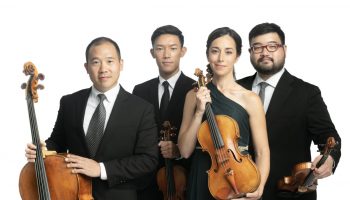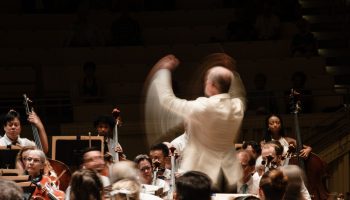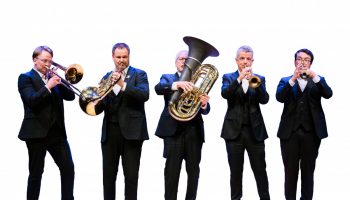
Alexander Kobrin is an internationally renowned musician, but when it comes to his style as a pianist, it’s not something he cares to think about these days.
“For too long I’ve been a hostage of trying to find the ‘right’ way — then I realized there is no right way,” Kobrin said. “You’re your own critic — you set your own boundaries, standards and ideas; your success in fulfilling those ideas is between you and you.”
At 4 p.m. today in Elizabeth S. Lenna Hall, Kobrin will perform Johannes Brahms’ Six Pieces for Piano, Op. 118; Robert Schumann’s “Arabeske,” Op. 18; and Schumann’s “Kreisleriana,” Op. 16, for his Piano Program Faculty Recital. Kobrin currently serves as the Heintzelman Family Artistic Advisor for the Chautauqua Piano Program.
All pieces he’s performed before — and at different life stages — Kobrin finds that they become autobiographical.
“The ‘Why I’m playing’ is because the sound makes me feel something very beautiful,” Kobrin said. “You really forget about the negativity around the world. It’s important to let yourself be carried away by this music.”
The individual pieces of Six Pieces for Piano carry different titles, including a ballade, a romance, a rhapsody, and a few intermezzos. Brahms wrote them in 1893 toward the end of his life and dedicated them to his lifelong friend Clara Schumann, accomplished pianist and wife of Robert Schumann.
“It’s very personal, nostalgic and beautiful,” Kobrin said.
“Arabeske” was written in 1839 when Schumann was petitioning the courts to marry his beloved Clara — not yet 21 and already a renowned pianist — because her father was opposed to the union. This time signified unconventional structures in Robert Schumann’s work that were considered somewhat controversial, but “it is very sweet and personal,” Kobrin said.
Schumann also composed “Kreisleriana” around this time of uncertainty for the young couple. As such, there is an overt emotional tone; the piece remains one of the staples of the Romantic solo piano repertoire.
“It’s a journey where the listener can really reflect on the subject. ‘Kreisleriana’ is linked to German Romantic literature with all its complexity, beauty and utopian ideas,” Kobrin said. “You kind of give up planning and just go with the flow to see where it takes you because on stage, it may just take a different turn. It won’t come to you if you don’t let it, so mentally, you go on stage and just be with it.”
Kobrin aims to be carried away by the music, but stressed that a musician losing oneself in sound can come at the expense of connecting with the audience.
“I don’t believe in losing yourself for the audience,” Kobrin said. “The audience will come along if you’re not distracted.”
Adding new life to pieces that have been played thousands of times is easy for Kobrin — “nobody has ever been me,” he said.
In teaching his students at Eastman School of Music, Kobrin finds that “we’re all unique.” He emphasized the importance of remaining curious to retain the urge for self-development, as “there is always something to learn.”
“We are interpreters,” Kobrin said. “Sometimes the audience comes expecting to hear a certain way, and artists are trying to play thinking of how the audience would expect to hear it. I’ve been working on music like that for too long, trying to find the ‘right’ way. You really start forgetting about all that once you trust your identity.”
Kobrin has won many top prizes in international contests — the gold medal at the Van Cliburn competition, first prize at Busoni International Piano Competition, top prize in Hamamatsu International Piano Competition and first prize in the Scottish International Piano Competition in Glasgow. However, upon retrospection, he felt that he wasn’t winning them for himself.
“My environment made me really depend on what’s going on in my profession,” Kobrin said. “My profession doesn’t define who I am. We evaluate ourselves as people based on professional success — don’t do that.”
When writing an essay for the Van Cliburn competition, Kobrin was given the prompt of “What’s the reason for you to come to the competition?” Kobrin answered that it was because he had never been to Texas before; the office certainly got a good laugh out of it, he said, because everyone else answered in relation to their career.
“Your life doesn’t depend on your success,” Kobrin said. “Now, I’m enjoying my time when I don’t care what you think — well, I do care a little. But at the end of the day, I have my family, my students and a nice book to read.”




